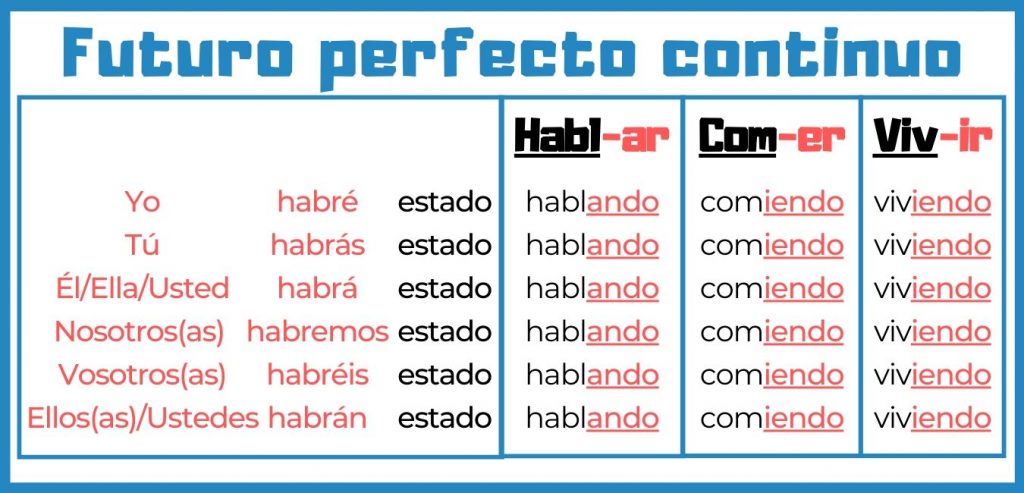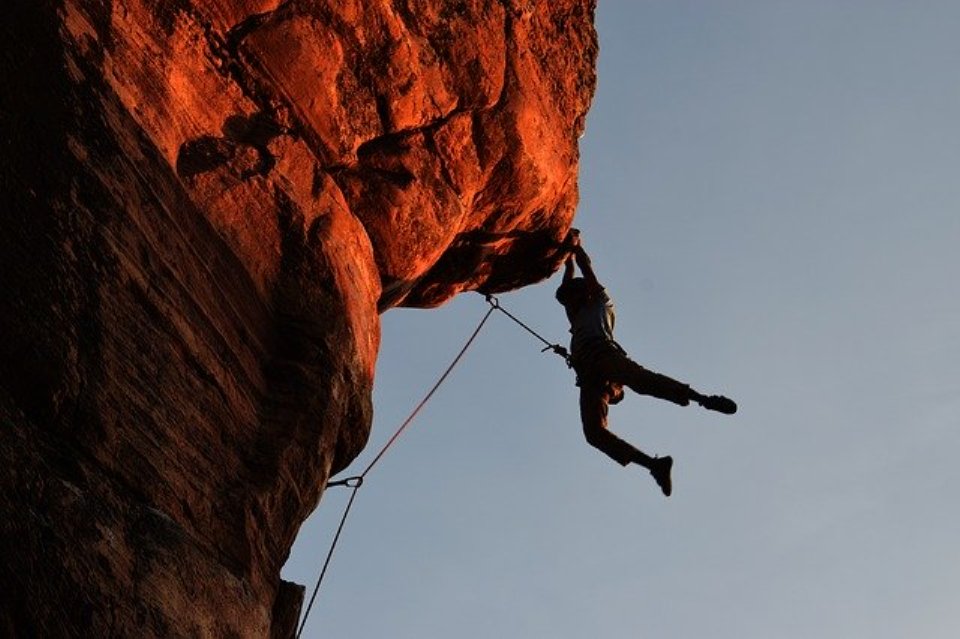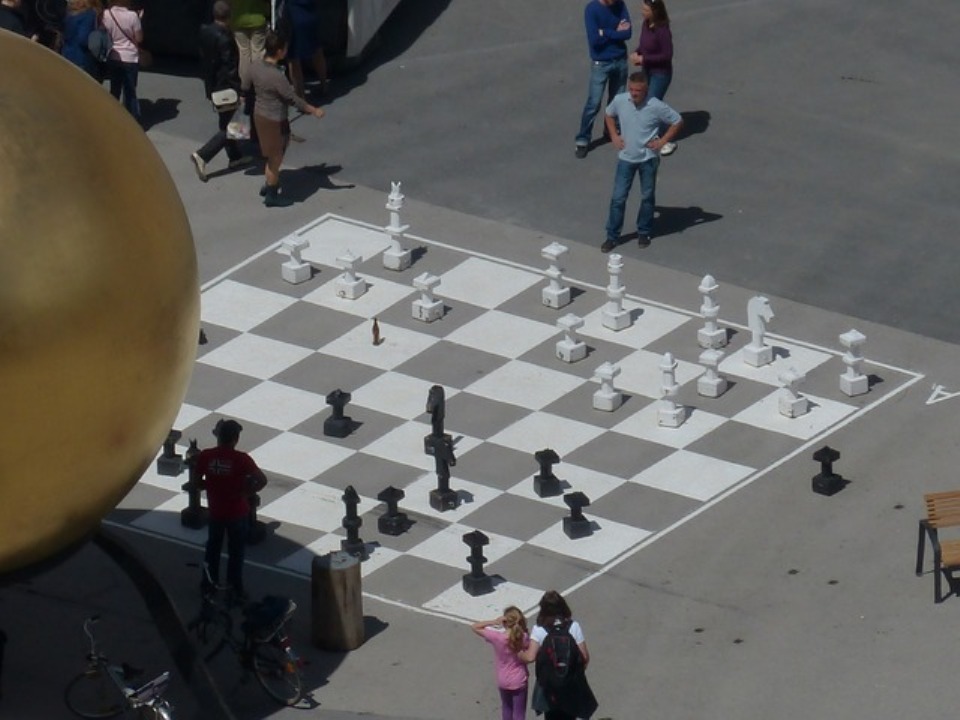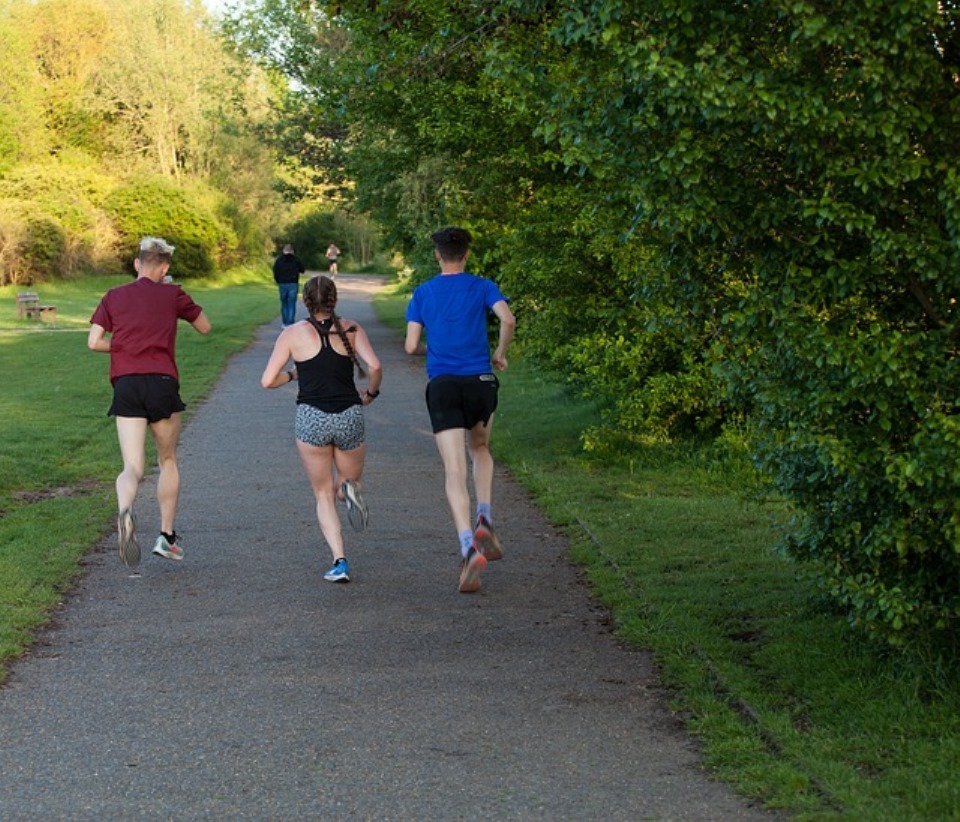
When I come at 6pm, will you have been studying long? I will have been learning Spanish for 3 hours. – Cuando yo vuelva a las 6, ¿habrás estado estudiando mucho tiempo? (Yo) habré estado aprendido español durante tres horas.
“Future Perfect continuous” highlights the duration of a completed action in a definite moment in the future -Usamos el “Futuro Perfecto. Compuesto continuo” para hablar sobre la duración de una acción que habrá terminado en un determinado momento del futuro.
A VIDEO WILL COME SOON: If the videos are too quick for you, use the playback speed and captions buttons for slow motion and subtitles. It is advisable that you listen to Spanish people talking. If you are a complete beginner, join our Spanish Lessons and contact Susana for more information +34 661 74 36 45.
1. Conjugación – Conjugation, how do we form it?
We use the verb to have in future plus the past participle of the verb estar (estado) and the gerund. For verbs ending in -AR add (-ando) at the end and for verbs ending in -ER, -IR (-iendo). – Se forma con el verbo haber en futuro más el participio pasado de estar (estado) y el gerundio. Si el verbo acaba en –AR añadimos -ando y si acaba en -ER o -IR añadimos -iendo.

2. Usos – when do we use it?
2.1. For highlighting the duration of a completed action by a specific or certain time in future – Para resaltar la duración de una acción que estará terminada en un momento determinado del futuro:
Cuando llegue a casa, Pablo habrá estado conduciendo durante más de doce horas. (Presente Subjuntivo)
Pablo will have been driving for more than 12 hours when he gets home.
Si no los encontramos hoy, los niños habrán estado bebiendo agua contaminada durante un día entero.
If we do not find them today, they will have been drinking polluted/contaminated water for a whole day.
3. DIFERENCIAS CON EL INGLÉS – DIFFERENCES WITH ENGLISH
There are not differences – No hay diferencias.
4. Marcadores temporales y expresiones de peligro – time and warning expressions
- *A esta hora el martes, habremos estado viajando durante 24 horas seguidas – By this time on Tuesday….
- Antes de que vuelvas, habremos estado viendo la tele 4 horas seguidas. – When you come back…
- Para entonces, habremos estado perdiendo trabajadores durante 2 años. – By then…
*4 Translate these sentences and leave your answers in the REPLY BOX
5. Ejercicio – Exercise
At the end of the page there is a LEAVE A REPLY section to send us your answers to this exercise. Ask and answer questions similar to the examples underneath for each one of the photos. Use the expressions in number 4. *Note: there is a list of verbs under the pictures. – Al final de la página hay un apartado para enviarnos tus respuestas a este ejercicio “LEAVE A REPLY”. Pregunta y responde a preguntas similares a los ejemplospara cada una de las fotografías. *Nota: hay un listado de verbos a continuación de las fotos.
- ¿Qué habrá hecho (él/ella) cuando lleguemos? Él/ella habrá …
- ¿Qué habrán hecho (ellos/ellas) antes de final de año? Ellos/ellas habrán ….
- What will he/she have done by the time we get there? He/she will have ….
- What will they have done by the end of the year? They will have…
The following verbs can help you complete the sentences: TO… play chess / smoke / eat / walk / run / climb / listen to music / sleep / ride a bicycle-cycle / cook / drive / read – Los siguientes verbos te pueden ayudar a completar las frases: jugar al ajedrez / fumar / comer / pasear / correr / escalar / escuchar música / dormir / montar en bici-hacer ciclismo / cocinar-preparar la cena / conducir / leer
- Cuando termine la Vuelta Ciclista a España, ellos habrán estado pedaleando durante un mes.
- Cuando termine el verano, él …
- Cuando lleguen los invitados, ellos … will have been cooking for…(translate, pls).
- Antes de final de año, él ……will have been visiting to all our customers (translate, pls).
- Para entonces, ella habrá estado yendo a comer a casa de su abuela durante un año.
- Antes de su fiesta de cumpleaños, ella ….
- Antes de que termine la competición, ellos ….will have been training 8 hours a day…
- …., ella ….
- …., ellos ….
- …, ella ….
- …, ella ….
- …, ellos ….
6. Ejercicio – Exercise
Translate these sentences into Spanish – Traduce estas frases a español.
- I will have been waiting here for three hours by six o’clock.
- By 2030 I will have been living in Spain for ten years.
- When I finish this course, I will have been learning Spanish for twenty years.
- Next year I will have been working here for four years.
- When I come at 6:00, will you have been practising long?
7. Ejercicio – Exercise
Cuando acabe el confinamiento ¿qué piensas que habrán estado haciendo los españoles? Creo que la mayoría habremos estado viendo películas, otros habrán estado leyendo. Unos pocos habrán aprendido a tocar un instrumento. Quizás, los más aventureros habrán creado su propio canal de youtube.
When the lockdown finishes, what do you think that the Spanish people will have been doing? What about the people from your country? And what about you and your family? I think most of us will have been watching movies. A few will have learned to play an instrument. Perhaps, the most adventurous people will have created their own YouTube channel. What do you think?

- Aceptar algún reto de un familiar.
- Compartir algún mensaje, video, foto por whats app.
- Aprender a tocar un instrumento.
- Empezar a escribir un libro.
- Hacer ejercicio en casa
- Aprender un idioma o mejorarlo
- Ordenar armarios, cocina, etc..
- Hacer pan o pasta en casa
- Hacer limpieza del trastero, medicamentos
- Restaurar algún mueble
- Hacer reparaciones
- Relajarse
- Aprender a bailar sevillanas
And remember!! Practice makes perfect
Come to practise with Spanish native speakers in our >> Off The Cuff Talks! << be brave and ask them ¿Qué estás haciendo?
Did you find it useful? Then, please… FEEL FREE TO SHARE IT!
Do you have any doubts or even a contribution? Please fill out the form at the bottom, and we will get back to you asap⏬
Join our Spanish lessons in Torre de la Horadada, San Javier, Mar Menor Golf Resort and Sucina (Casas Blancas)
This is just a small example of what you can learn. Get the support of the best Spanish Tutor in the area, Susana Romero, and enjoy learning Conversational Spanish.












